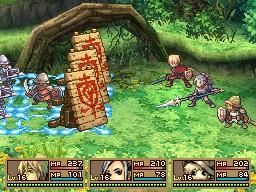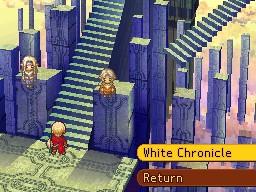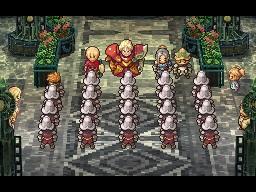
Radiant Historia Review
It goes without saying that, for better or worse, the Nintendo DS handheld is pretty much the mecca when it comes to RPGs. Whatever flavor you are looking for, it has you covered, whether that is tactical, strategic, traditional, sci-fi, adventure, storybook, banana, apple, maple, dinosaur, plant, toenail... wait, what?
Anyway, you get the point - there's an ungodly amount of RPGs on this damn thing. Well, good news for everyone, I may have discovered the coveted needle in the haystack, and it happens to be another fantastic recommendation from the Atlus pantheon.
The world of Vainqueur has fallen into a desert wasteland - the threat of this desertification is setting in and war is being fought over whatever fertile land is left as a means to harvest and feed the people on their respective side. The holy kingdom of Alistel is under threat by the western nation of Granorg and its aggressive tactics of invading other territories for their land in a desperate act to survive. Stocke, the hero of our story, works in Alistel's Special Intelligence, taking missions from its chief, Heiss. Two vagabond mercenaries, Raynie and Marco, have been taken in by Heiss after their troupe was annihilated by Granorg's army, and will accompany Stocke on most of his missions.

Through a sequence of unfortunate events during a mission that leaves our hero knocking on Heaven's door, Stocke soon finds himself in a mysterious world dominated by a centerpiece of large steps leading up to a huge, ominous door. Above Stocke sits Lippi and Teo, the guides of the place known as Historia, a world in time's gulf, created by the power of Flux. They summoned Stocke as he is holder of the White Chronicle, the book that was handed to him by Heiss in order for him to discover its purpose.
Stocke is told that he must use the power of the book known as White Chronicle to radically alter history's chain of events, going back to take a different direction and rewrite the course of history for the better. Another purpose is to sift through obstacles in order to find a means to keep him and his allies alive. He will also find other people outside of his main objective who request his help and may provide new items of equipment or helpful advice that will be significantly helpful in his journey. What he soon finds out, however, is that there are powerful opposing forces in play that are looking to disrupt what Stocke is trying to accomplish with their own means to an end.
Although it is a substantial opportunity, the power of the White Chronicle doesn't put Stocke in an entirely advantageous position. There are two types of moments: ones that the whole world experiences, and one that is limited to Stocke himself. His own time cannot be reversed even if he changes the course of history. In his case, things to him still happened. If he is horribly wounded or even killed, he cannot go back and undo that. That includes if you are damaged in battle, or you use magic, you will not regain your HP or MP, and will have to heal up after time traveling.
Now, jumping in and out of the tenses of time itself may prove complex, and there were moments where I had absolutely no idea what the hell I was supposed to be doing and what event still needed to be triggered to advance the story. Fortunately, the guardians of Historia will remember prior conversations that Stocke has with them and can give you a nudge in the right direction should you get lost, and it usually just takes a few moments of clarity.

It is this attention of detail for a design that the developers could have easily run wild with, but instead made profoundly logical decisions that gamers who appreciate a smart use of a fascinating concept. In fact, after spending nearly 40 hours on this game, I don't think I ever experienced any sort of plot hole. Any questions I had were always answered in due time; it feels pretty damn good to say that about an RPG.
The story also likes to address some rather mature themes, such as love lost (and love found), the bonds and strains of friendship, and how the affair of politics casts its heavy shadow down on all of this. There is also the ever-present threat of Sand Plague. This inauspicious term refers to a mysterious phenomenon that causes people to turn suddenly into sand. When Mana, the essence of life in all living things, is lost, it turns one to sand. Dying causes mana to leave the body, but losing mana first before dying causes them to turn to sand. Sand Plague dramatically drains mana from the living body. The fact that such a scary concept exists is a testament to the length that this game goes to bring a more adult focus to the genre.
Battles take place on a 3 x 3 grid separate to you and your foe. The damage you can deal to an enemy depends on where they are located on that matrix - the closer they are to you, the more pain they take. Some skills can be used to knock people around that grid. By knocking one enemy into the occupied space of another, you can deal damage to both of them with a single move. Attacking the same enemy in succession creates Combos, which allows you to deal higher degrees of damage along with creating more EXP and money bonuses. Using different skills in your combos, such as casting magic after hitting an enemy with a physical attack, increases the Combo Level significantly.
This becomes a key strategy later on in the game when enemies and especially bosses become exponentially more tough to defeat. It is the inclusion of so many different tactical elements that keeps battles interesting, and keeps it from falling into the usual tropes of the genre.

The best feature this game has in on truly amazing soundtrack. Composer Yoko Shimomura (who also did the music for the Kingdom Hearts series and who is also covering Final Fantasy Versus XIII) definitely worked her talented ass off in presenting perhaps one of the better examples of what the Nintendo DS's tiny speakers are capable of producing. From the adrenaline rush of violin-playing that the boss battle music brings to the chilling tones of Historia's haunting purgatory, every track in this game is distinctly Shimomura in every way possible and does a superb job in complementing the design and look of the game.
When you get right down to it, people may interpret Radiant Historia as sort of a modern-day Chrono Trigger, in that you must make leaps to and fro the moments in chronological history to change the course of events. So... that's exactly what it is. If you're looking for a sequel to Chrono Trigger, this game is pretty damn close to that realization, save for the fact that you don't have an anthropomorphic frog or hot bespectacled inventor along with you for the ride. Oh, and my hero Robo.
But it is also a lot more than that. On merits alone, Radiant Historia offers a great breathe of fresh air in a crowded flow of stale carbon copies that have slowly been gathering more and more handheld RPGs in its riptide. Whether it is the game's cool-as-ice cast of characters, the mightily-impressive sound track that threatens to blow one's mind, or the intricacies of the compelling narrative, there is plenty of fun to be had in this miniature juggernaut. If you happen to own a Nintendo DS, and you're looking to book a trip into a different dimension, you really owe it to yourself to give this game a try.